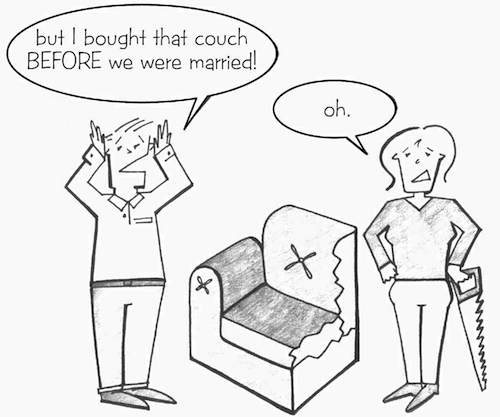

by Miriam Kurtzig Freedman, J.D
Illustrations by Daphne San Jose

Marriage is a K. John and Mary promise to fulfill the duties of a married couple as imposed by law. These include support, inheritance, and consortium. Consortium is the legal right of one spouse to the company and affection of the other.
John and Mary marry after fulfilling the stateís requirements (including age and mental competence), obtaining a license, passing blood tests, and having a ceremony with witnesses. Their marriage is a ìspecialî K because John and Mary cannot dissolve (end) it. Only a court can.
Common law Marriage:
If John and Mary live in a state that recognizes this type of marriage, they may enter into it as follows: They can live together (cohabit); and they can ìhold themselves outî as if they were married, by telling others they are married and referring to themselves as married people. Common law marriages do not require ceremonies or licenses. And contrary, to popular belief, the cohabitation period need not always be as long as seven years. It varies from state to state.
Prenuptial agreement:
Also called premarital or antenuptial agreement: A K that two people may write and agree upon. It details their rights and duties, especially with respect to property and debts. The goal of a prenuptial agreement is to minimize future disputes in case of divorce or when one spouse dies.
Living together:
From a general legal standpoint this arrangement is not a marriage. John and Mary live together. Period. Recently, however, some states have held that express or implied agreements between John and Mary during their life together are enforceable after they break up.
Separation:
A legal term that refers to John and Maryís agreement to live apart although they are married. They may enter into an agreement about all aspects of their separation.
Note: if John or Mary later breaches their agreement, the court will treat it as a breach of K.
Legal separation:
A legal term that refers to a court order. If John and Mary cannot agree on terms of a separation, either of them may sue the other in court. If the court orders the terms of separation, the order is a ìlegal separation.î It may also be called ìtemporary orders.î
Note: if John or Mary later breaches this order, the breach will be treated as contempt of court.
Desertion or abandonment:
The legal result of Johnís or Maryís leaving the other without an agreement between them. Desertion is a ground, or legal cause, of fault divorce. Check state law, as each has a different description of what constitutes desertion.
Remember that laws of marriage and divorce are established by the states because of the Tenth Amendment to the Constitution. These amendment reserves to the state or people all powers not delegated by the Constitution to the federal government. There is no federal marriage and divorce law.
Divorce or dissolution:
The end of a marriage by court decree. Dissolution is the term more often used in no-fault actions. Following a divorce, Johnís and Maryís rights and duties are specified from the date of the final decree.
Annulment:
A court decree stating that John and Mary never legally married because they didnít fulfill the requirements of marriage. Perhaps John or Mary fraudulently deceived the other.
Following an annulment, John and Mary revert to their premarital status. They are single, have never been married.
Fault divorce:
What may result if John or Mary sues the other for divorce, claiming that the spouse is ìat fault.î Note that the fault needs to be proven.
Different grounds of fault include:
Contested divorce:
If John and Mary cannot agree on the terms of their divorce. Their case will be argued, or contested, in court.
Uncontested or default divorce:
When John and Mary agree on the terms or one of them does not appear in court. The court finalizes the agreement or default.
No-fault divorce or dissolution:
A divorce that is decreed in a state with no-fault divorces. In this type of divorce couples may be able to meet the standards of proof easily. A marriage can be ended for the following reasons, or grounds:
Quickie divorce:
What occurs if John or Mary goes to a state or country with a short residency requirement for divorce for the purpose of obtaining the divorce.
This kind of divorce dissolves the marriage only. It cannot deal with custody or property issues, because that state or country has no jurisdiction over those issues.
Alimony:
Money for support and maintenance to which one spouse is entitled from the other spouse after a divorce or separation.
The court usually awards an amount based on need. Payments often end if the receiving spouse remarries or if either spouse dies.
Palimony:
Support (money) that may be awarded to John or Mary, even if unmarried, after they stop living together. (They must have had an enforceable agreement between them.) This new doctrine in the law exists only in some states.
Child custody:
John and Mary will have the rights and duties of care and control of their child following a divorce or separation. Legal custody is the right and duty to make vital decisions about the childís education, medical care, religious training, and similar issues.
There are two basic arrangements:
Child support:
Payment for the child's care and support from the noncustodial parent to the custodial parent. These payments usually end at the childís age of majority, or when he completes his education, or when he becomes emancipated.
Division of property:
What property do John and Mary get after a divorce? Property includes anything that can be owned, such as a house, land, jewelry, money, stocks, patents, and rights (e.g., a copyright on a book).
There are two major division patterns in the different states....
Divorce decree:
The court order that ends the marriage. It determines all the issues between John and Mary.
Interlocutory decree (decree nisi):
A temporary decree, issued during the proceedings. There is generally a waiting period before the decree can become final.
Final decree:
Issued at the end of all proceedings. Any breach of the decree is treated as contempt of court.
Home - The Little Law Book - Legal Grind®
EliteAttorneys.com
2640 Lincoln Blvd, Box 6
Santa Monica, CA 90405
310.452.8160
info@eliteattorneys.com